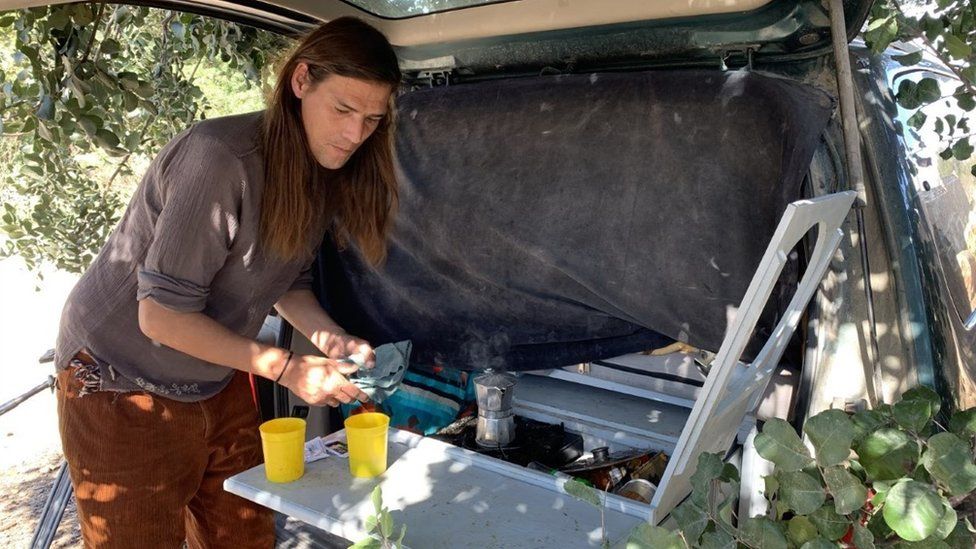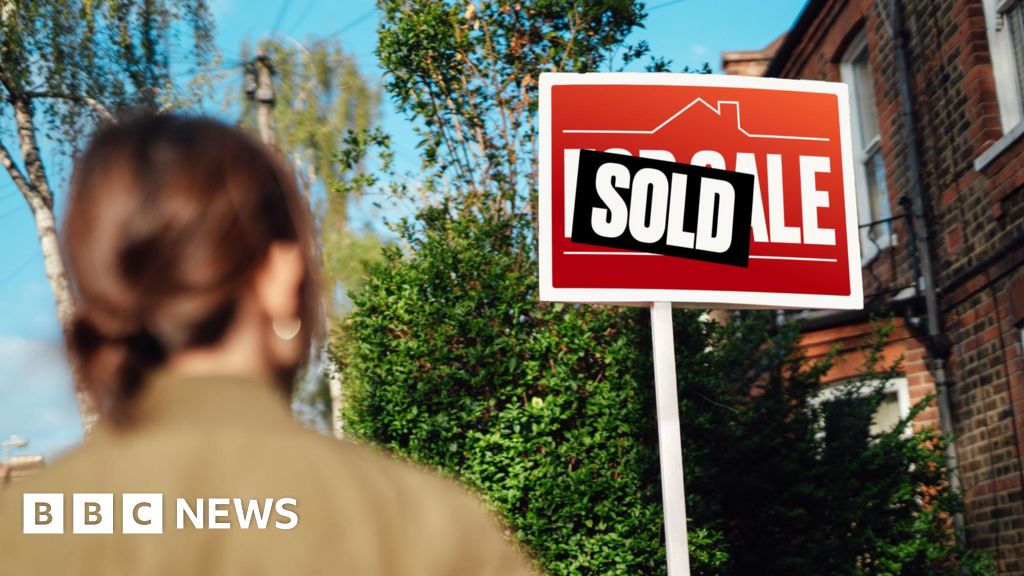ARTICLE AD BOX

Chef César Nebrera is having to live in his car
By Guy Hedgecoe
BBC News, Ibiza
César Nebrera pours out a cup of coffee he has brewed on a stove in the boot of his car. The old green Kia saloon sits in the shade of a carob tree just off the main road near Ibiza Town.
"I miss the basic things that make life comfortable, like being able to stand up in your own home, being able to cook properly, or even open a drawer and pull out some socks," he says.
"Those are the kinds of things that you miss out on when you live in a car."
César's Kia has been his home for the past three years. He works as a chef, but with rental costs on the Spanish island of Ibiza having spiralled, he cannot afford to live in a flat.
"In Ibiza, accommodation is very expensive, and it's getting more and more expensive," he says. "And the cost of renting is completely out of kilter with what you earn. So living like this is an alternative. It's less comfortable, but it allows me to keep living on the island."
Ibiza is one of the four Mediterranean islands that make up Spain's Balearic Islands. The others are Majorca, Menorca, and Formentera.
Many local professionals in Ibiza are living in similarly precarious conditions because of high rental costs. Last year, the IGC, a representative body of the civil guard police force, said that "three or four" of its officers were living in vehicles on the island.
Other locals have resorted to living in tents, or in extremely basic shared accommodation.
Image source, Getty Images
Image caption,It can be more lucrative for property owners to rent apartments to Ibiza's many visiting tourists
Daniel Granda, spokesman for the Sindicato de Inquilinas de Ibiza y Formentera, an organisation that represents local tenants, says such situations are becoming commonplace.
"A lot of people end up in quite miserable conditions, and we're starting to see slums across the island," he says. "Without the possibility of finding accommodation that allows us to live normally, those of us who live on the island have the feeling that we are being pushed off it."
High interest rates and a recent cost-of-living crisis have deterred many Spaniards from buying property, creating an increase in demand for rented accommodation, which has pushed rental costs up. Rental prices across the Balearic Islands have increased by an average of 18% over the past year alone, compared with a 12% average increase nationwide.
However, Ibiza's status as a tourism hub situated in a relatively small area has supercharged this phenomenon on the island, leading to much steeper increases, in some cases up to 40 or 50% over the last year alone.
Isabel María Pérez, who has searched for affordable accommodation on the island, says that a single room costs between €700 and €1,000 ($760 and $1,086; £600 and £857) per month, while a modest flat can cost around €1,500.
Isabel, who works as a cashier in a supermarket, and her partner, who has a job in a five-star hotel, had to move out of their rented apartment when it was sold. Since then, they have been living with Isabel's mother-in-law. Originally from the central Spanish region of Castilla La Mancha, Isabel says that she and her family are now considering moving back to the mainland, purely because of the housing situation.
"The problem in other parts of Spain is that there isn't much work," she says. "Here there's all the work you could want, but there isn't anywhere to live."
Unemployment in Ibiza Town, the island's capital, is at just under 5%, compared to 8% in Madrid or 19% in the Andalusia region's capital Seville.
With a population of just 160,000, Ibiza received close to four million tourists last year, a new record, and 84% of its economic activity is linked to tourism, according to the local government. While its hotels, restaurants and clubs provide plenty of employment, a large portion of its housing is only available at short-term tourist rates, and local workers are priced out of the market.
Image source, Getty Images
Image caption,The government of the Balearic Islands has ruled out rental price capping
The conservative regional government of the Balearic Islands, which came into power last year, has chosen not to implement a housing law approved by the Spanish government in Madrid which seeks to cap rentals in areas of the country where they have soared.
Instead, the local authorities mainly attribute the housing problem to homeowners in residential areas of Ibiza who are flouting the law by offering their properties for short-term rental, when local laws state they must rent for at least six months at a time. The local government says that since 2019 it has imposed around €4m euros in fines related to illegal activity in the tourism sector.
"The problem is that you earn much more money renting for days or for weeks than if you rent according to the law," says Juan Miguel Costa, head of tourism in Ibiza.
He says that regional and municipal authorities need to work together "to attack that idea of impunity that there has been on the island, that it's very easy to offer an apartment [for tourism] illegally in a residential building, or offer a property as a holiday home without a holiday licence."
Mr Costa also attributes the rental increase to many homes remaining unused throughout the year, because of owners' concerns about possible squatting, further reducing the supply of housing for local workers.
An irony of Ibiza's housing crisis is that it is now threatening to undermine the same tourism industry that is so widely blamed for causing the rental rises in the first place.
"Anyone who lives here keeps saying the same thing: something has to give because the prices keep going up," says George McBlain, operations director at O Beach, a discotheque and restaurant that employs workers from the island, mainland Spain and abroad.
"Obviously, salaries go up a little bit, but not enough," he adds. "I've got friends here and their rents have jumped up by double in the space of a year. And if that continues, what you're going to see - and it's already happening - is that workers coming to the island are going to pick elsewhere."

 9 months ago
58
9 months ago
58








 English (US) ·
English (US) ·